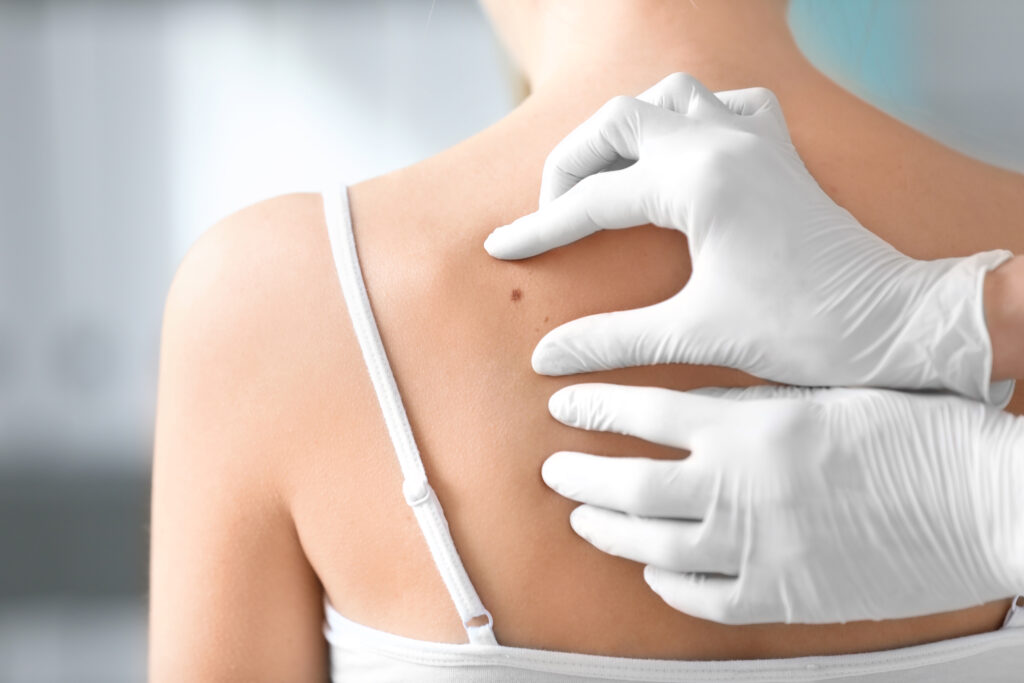The Role of Biopsies in Diagnosing Skin Conditions

A skin biopsy is a relatively common medical procedure where a section of skin cells is removed from the body for further testing. Often, skin biopsies are used to diagnose certain skin conditions and even skin cancers.
Diagnostic biopsies have been around since at least the mid-1800s when German dermatologist Gustav Simon first described the microscopic features of normal and abnormal skin cells. Over the years, however, medical advancements have made skin biopsies more effective than ever at diagnosing a wide range of skin conditions and diseases.
Types of Skin Biopsies
Three main types of skin biopsies are available, each varying in the specific technique used to remove the suspicious skin cells. These include shave, punch and excisional biopsy. Each type of biopsy has a place in dermatological care, and an experienced healthcare professional can determine which type of biopsy is best for a patient based on several factors.
Shave Biopsy
With a shave biopsy, a small razor tool is used to scrape cells off the surface of the skin. This type of biopsy tends to be the least invasive, not typically requiring any sutures. A shave biopsy is most commonly used to test superficial skin lesions.
Punch Biopsy
For deeper skin lesions or inflammatory lesions that require cells to be removed from beyond the surface of the skin, a punch biopsy may be recommended. With this type of biopsy, a round-tipped cutting tool is used to remove a core of skin, including some deeper layers of the epidermis and dermis. A punch biopsy provides more comprehensive testing but often requires sutures to close the wound.
Excisional Biopsy
In an excisional biopsy, a surgical scalpel is used to remove a larger area of skin and tissue. Typically, the area around the skin is completely numbed before this more invasive procedure, and stitches are necessary to close the wound. This type of biopsy may be needed when testing for suspected melanomas or more serious skin conditions.
The Role of Biopsies in Dermatologic Diagnosis
When performed properly, skin biopsies are extremely effective and accurate in diagnosing any number of skin conditions. Cells from a skin biopsy can be studied under a microscope to determine whether they are benign or malignant. These skin cell samples can also be used to diagnose several inflammatory skin conditions.
Perhaps most critically, skin biopsies can detect skin cancers, including basal cell carcinoma, squamous cell carcinoma and melanoma. When detected early, these cancers have high rates of successful treatment.
Patient Care and Considerations
If you need a skin biopsy, our dermatological team will ensure you are as informed and prepared as possible for your procedure.
Pre-Procedure: Patient Preparation
Before your procedure, we’ll take the time to discuss the specific type of biopsy being performed and the potential conditions we will be testing for. This is also a great time for you to ask questions or address any concerns about the procedure. Our team is more than happy to help.
Post-Procedural Care
After your biopsy procedure, our team will also provide detailed instructions on caring for your wound. If you receive stitches following your biopsy, you’ll need to follow specific instructions for caring for the wound at home to prevent infection. If any follow-up appointments are scheduled, be sure to attend, as these are important for ensuring that any wounds are healing properly.
Technological Advances and Biopsies
Technological advances surrounding skin biopsies have come a long way over the years, with methods now as minimally invasive as possible. Likewise, skin biopsies and diagnostics have become increasingly accurate with smaller samples, with waiting times for diagnoses decreasing significantly over the years.
Dermatology Associates of Plymouth Meeting Approach
At Dermatology Associates of Plymouth Meeting, we’re committed to your comfort and safety with all procedures performed in our office. With our personalized approach to each patient, we can minimize any discomfort and anxiety during your appointment.
Meanwhile, skin biopsy results are always integrated into a broader care plan, drawing on collaborative efforts with other specialists for comprehensive treatment. Throughout every step, we ensure that our patients are as informed and educated as possible with the resources they need for post-procedural care.
Need To Schedule a Skincare Consultation?
Today, skin biopsies are less invasive and more accurate in diagnosing skin conditions than ever before. With improved diagnostics, dermatological teams can provide quality care to improve patient outcomes.
If you need a skin biopsy or are interested in scheduling a consultation, get in touch with our team today by calling (610) 947-4322.
